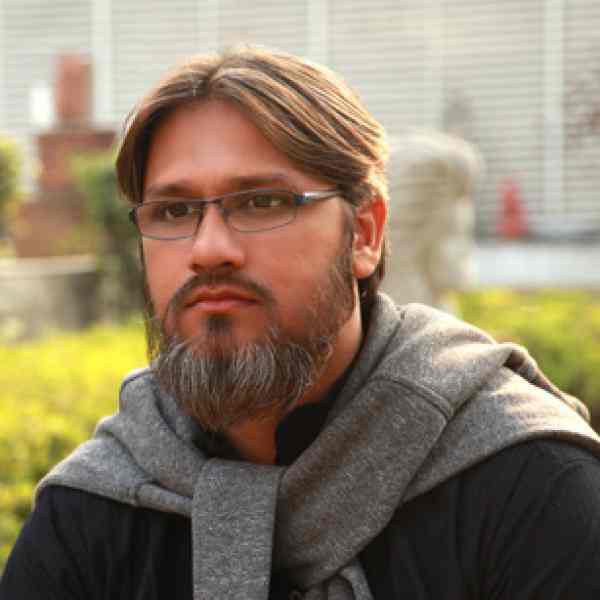前書き
Leaders involved in negative politics repurpose religion from being a source of unconditional love to unconditional hate. This gives them quick leadership but makes the community never get out of the conflicts it is in. Terrorism happens when a community suffers injustice (perceived or real) and its leaders are not equipped with the skill to turn enemies into friends. Basit Jamal is facilitating young people to understand the concepts of conflict resolution in the language they accept i.e. Religious Language. Basit Jamal is repurposing the power of religion to be a solution rather than a roadblock to conflicts which has already seen millions die world over. He works with students from Schools, Colleges, Madarsas, and worshippers in the Mosques. He also promotes interfaith dialogue as a means to better understand the other. Hundreds of young people who were seeing "kill your enemy" as the solution are now creating a demand for turning "enemies into friends".
新しいアイデア
Basit is creating a network of empowered Muslim youth and clerics to challenge and change the current radical narrative around Islam. By doing so, Basit aims to create a platform for de-radicalisation focused on Indian Muslim youth, and mainstream an inclusive and peaceful understanding of the religion, instead of the highly polarised, sectarian and violent interpretations Islam is globally being subject to.
The Quran is the north star of a Muslim believers’ life. S/he acts in accordance to Quranic teachings and laws. However, a section of the Muslim clergy in India, along with sectarian interest groups, exercise full control over these Quranic interpretations, and by extension, how Muslims should live, think and act. They do not tolerate alternative interpretations of the Quran, and instead deploy these narrow, violent interpretations to radicalise impressionable Muslim youth against the government and the multi-religious environment they live in. This sentiment is exploited by extremist terror organisations, pressing upon the new generation of radicalised Muslims to turn violent.
Basit recognises that without an alternative way to access the Quran, where the youth can read and ponder on the Quran, radicalisation by extremist forces will continue to rise. Through a series of talks and story-telling workshops, Basit has created a space within conservative Muslim circles to promote a non-violent and inclusive interpretation of the Quran. By leveraging the power of Quranic teachings, a source that is inviolable for most Muslims, Basit is demonstrating how reflection and critical thinking is integral to understanding Islam, and being a good Muslim. In doing so, he is dismantling deep-seated, one-sided beliefs that have so far controlled the relationship between the faith and the believer.
Basit works with non-religious CSOs, schools and Islamic centers to target Muslim youth and young ulemas and enables them to arrive at their own Quranic understanding. In addition, Basit is also cultivating a network of influential core group of ‘preachers’ who promote this alternative and harmonious version of Islam. Basit believes that by doing so, he can challenge the current power centers within Islam, promote an alternative, liberal understanding of Islam that most Muslims believe in, and stem the tide of extreme radicalisation in India and across the world.
問題
As the largest minority in the country (14 percent of the population), Indian Muslims have had a tumultuous relationship with the Indian mainstream. Muslims are often at the receiving end of blanket social and cultural prejudices, and find themselves discriminated against for political and economic opportunities. Also, India’s long history of communal tension and violence against Muslims, where the community was targeted and threatened, has added to a growing sense of alienation within the community.
In response to a hostile external environment, the prejudice within Muslim groups against non-Muslims has peaked. Extremist leaders within the Muslim community have exploited this sense of alienation to drive large scale radicalisation of the youth in some madrassas, religious courses at some Islamic centers and more recently, through online sermons. By highlighting a) the excesses of the Indian state and other countries engaged in conflict with Muslim communities; b) violent and secessionist interpretations of Quranic verses; and c) the poor socio-economic status of Muslims, a hyped-up narrative of Islamic retribution against the ‘other’ is being promoted by the extremist section of clergy.
Moreover, this alienating and violent version of Islam is steadily becoming the most dominant narrative in the community. This is because the interpretation of the Quranic verses is held by a few power centers (clergy and Islamic scholars) who use selective examples from the Holy text to prejudice their followers. Of these, the Muslim youth are a particularly susceptible group. In this narrow version of Islam, independent study and research of the Quran is forbidden as the clergy’s word is accepted as the ultimate ‘truth’. In lieu of this, there are few institutional safe spaces where interested Muslim youth can debate and discuss a peaceful interpretations of Quranic verses and stories.
Without direct access to the Quran, Many Muslim youth, which include many budding Ulemas (Islamic teachers), are only exposed to a radical version of Islam, thus creating a generation of extremists who sympathise with terror attacks, denounce the Indian state and follow radical leaders who coax them into violence. Coupled with their own sense of alienation from the Indian mainstream, these youth contemplate joining terrorist outfits, like ISIS, to fight what they perceive to be the Holy War against non-Muslims or more liberal Muslim sects. For instance, in 2016, 21 Muslim youth fled the coastal state of Kerala to join the ISIS in Syria. On the other hand, a generation of Islamic teachers and scholars are also being influenced by extremist propaganda that uses a selective reading of the Quran to radicalise these future teachers.
To address this large-scale radicalisation in the Muslim community, progressive Muslim voices have tried to stem the tide. Liberal Maulanas have tried to steer youth away from extremism by highlighting Islam to be a peaceful religion. However these lone voices are rejected and isolated by the so-called ‘authorities’ as un-Islamic. The recent de-radicalisation programmes announced by the government focus solely on inter-faith activities like sports, drama, liberal education for children, without addressing the root of this extremism within the community.
Basit recognises that an alternative system of learning the Quran has to be created and institutionalised. Moreover, multiple versions, or the act of interpreting the Quran for oneself, needs to be encouraged amongst Muslim youth who are strong believers of the faith so that they don’t simply accept narrow and violent interpretation of Islam. Basit also recognises that the community worldwide is grappling with a conflicted picture of Islam, and is keen on conversations that will spur an inclusive and peaceful image of Islam within and outside the community.
戦略
Basit is creating a platform of de-radicalisation for Muslim youth through a new, inclusive framework of interpreting the Quran. Basit has assembled a counter-narrative to the current extremist definition and purpose of Islam, and is creating institutionalised safe spaces that encourage debate and discussion amongst the Muslim community.
Basit recognises that he needs to take radicalised Muslim youth on the same journey that he undertook, where his framework for understanding the Quran shifted significantly from reactionary to conciliatory. A noted scholar himself, Basit leverages his ‘preacher-like’ status within different Muslim communities to deliver talks and workshops, thus creating a demand for his inclusive and liberal outlook of Islam. Because of the heightened levels of prejudice against alternative theories of Islam within the community, Basit knows he must craft a message that appeals to all factions (Shia, Sunni, Barelvi, Wahhabi, Sufi etc.). Basit thus leverages the teachings of Quran directly since all Muslims uphold the Quran as the ultimate truth. This helps him break through sectarian barriers without opposition and access a wider audience for his message.
By repurposing Quran, Basit is gradually taking the power of interpretation from extremist/radical handlers of the text, and encouraging the common believer to access the Quran him/herself. He does so by focusing on stories and anecdotes in the book that are usually ignored by the extremists, since they are open to multiple interpretations. For instance, in response to the widespread belief that the Prophet himself propagated holy war, Basit focuses on the historical context in which the verse was written, the Prophet’s several attempts to avoid a war in the first place, and the Quran’s insistence to ‘reflect, understand and ponder’ over all its content. Usually extremist scholars would isolate these violent verses to exhort the audience to fight against non-believers. Basit counters this by building critical-thinking skills of his audience to make their own interpretations, instead of blindly following what is being told to them.
Basit works with three different target groups—a) students and young people; b) budding scholars and clerics; c) a trained core group of religious changemakers. Basit collaborates with non-religious, secular NGOs to tap into their youth base, and introduces sessions on the Quran alongside other skill-building and personality-development courses offered by the NGO. For instance, he has collaborated with NGOs from around the country to access school children and youth groups, of which many members were on the verge of radicalisation. Basit creates safe spaces for discussion and debate with these students, kindling their critical thinking skills when dealing with “controversial” teachings of Islam. By strategically targeting youth, in areas where religious unrest and radicalisation is a constant threat to the population, he is preventing a generation from turning into hard-core terrorist cadre. Basit has recently created a 3-day programme for students and scholars to train them as peer-educators so that they can build spaces of discussion in their communities.
Through quick referrals, Basit is being invited to collaborate with madrassas, Islamic schools and Islamic thought centers. Through these connections, he targets clerics-in-training or those keen to engage their dwindling following through an updated understanding} of Islam. Basit recognises that at some places the curriculum and pedagogy of learning the Quran has also been controlled by extremist clergy and scholars, which cuts off access directly to the source material. Basit is reversing that trend by creating training programmes for younger clerics that not only leverage verses from the Quran directly, but also create an environment of open questioning and reflection on what is being learnt. In such institutionalised safe spaces, clerics are able to shift their mind-sets from being passive receivers to active learners. Being trained in this new methodology helps them, in turn, attract more young people to their own classes. For instance, he recently held a 6-day Quran workshop with maulanas from an influential Madrassa in Uttar Pradesh (a state with a high concentration of Muslims), in order to train them in developing various narratives of the Holy text, which the preachers then used in their Mosques and madrassas.
Given the magnitude and complexity of the problem, Basit recognised early that he needed to build a cadre of leaders in the movement to replicate his work and message in multiple settings. From his audiences, Basit has selected a dozen young leaders to train them in this counter-narrative of Islam called the God’s Cause. These individuals are a combination of local Mosque preachers, religious Muslim youth and young people brought back from the verge of radicalisation. Basit is leveraging their inherent public speaking skills and popularity in their communities to unlock their potential as new-age Muslim leaders.
Basit’s collection of talks, workshops and sermons have reached out to over 8,000 people in the last three years. Going forward, Basit plans to create a non-sectarian, Muslim institute of thought leadership through which he can more formally connect with Muslim youth, clerics and leaders to promote his understanding of peaceful Islam. For this purpose, Basit is working on formalising his curricula, building networks with non-religious NGOs and positing himself as an alternative Muslim voice amongst all the extremist schools of thought. Basit’s ultimate aim is to disassociate the faith from the politically violent and hateful interpretations of extremist groups, and mainstream a more common-man understanding of the Quran, which allows the development of a peaceful relationship between Islam’s followers and the rest of the world.
人
In his journey so far, Basit has donned many personalities. As a young boy growing up in Delhi, Basit lived a comfortable, middle-class existence. His father was an IRS officer whose beliefs swung from communism to Sufism, while leaving the family to develop their own beliefs. Basit grew up removed from the religion he was born into—Islam—and his only interaction with other Muslims would be through his extended family. A star athlete in school, Basit was a national-level football player and swimmer, winning many accolades for DPS R.K. Puram, which was ranked as a top school in the country. Basit excelled at both athletics and public speaking, till a chance encounter with doping turned him off sport professionally. Despite the insistence by his coaches, he refused to take drugs to enhance his performance and gradually moved away from his life at national stadiums.
Now in college, Basit began to find connections between science, which he loved, and Islam. Because of this, his interest in the Quran grew rapidly, and a strong belief in God developed. While on the one hand Basit was getting more interested in the religion, on the other, he relied heavily on the interpretations of extremist clerics and extremist Muslim leaders to explain what Islam stood for. Increasingly, Basit was exposed to radical and extremist Muslim thought leaders that enforced only one radical interpretation of Quranic verses, and heavily discouraged independent Quran study or questioning. Basit not only imbibed this definition of Islam, but also leveraged his natural inclination towards public speaking to hold informal talks in his college communities about the “truth” of Islam. In his personal life and distancing himself from anything that seemed ‘un-Islamic’.
A significant inflection point in his journey came when one of his other natural inclinations, of research and reflection, began conflicting with this approach to Islam. He began to pull away from his extremist teachers towards more progressive Islamic scholars who preached a more peaceful version of Islam. These Maulanas went onto contradict Basit’s extreme positions and taught him the key lesson of how the same religious text could have multiple interpretations. Basit, feeling betrayed by his former teachers, now began to research and interpret the Quran for himself, often leveraging his former speaking spaces to introduce his new understanding of Islam.
Basit soon realised that to truly stem and change the tide of radical Islam within the Indian Muslim community, he needed to open more spaces for youth like him to explore their relationship with Islam. He recognised that a majority of young Muslim people, who kept their religion front and center, were being swayed by the prevalent extremist ideology. Basit recognised that he had to target the same communities and present an alternative, more accepting view of Islam to the youth. This is how his last and final avatar, that of the social-enterprise-preacher was born.




